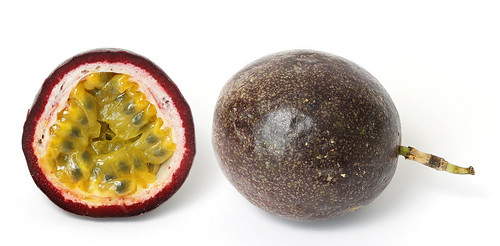Lilikoi, sometimes written liliko'i, is what the Hawaiians call passion fruit, although passiflora edulis is native to Brazil, Paraguay and Argentina. Passiflora literally means "suffering flower," given the name by Catholic missionaries who wanted the name to reflect the Passion of Christ. Either yellow or dark purple, the passion fruit smells and tastes sweet and tart, and is found in many commercial products from shampoo to juice. In Hawaii, lilikoi-flavored syrup is very popular, as well as jams, jellies and butters. The purple and yellow varieties are special in that these are the only two varieties grown commercially - the majority produced in Hawaii.
Lilikoi is pronounced LEE-lee-ko-ee, and said speedily it sounds like LIL-ih-koy. Where did the Hawaiian name for passion fruit come from? When seeds of the plant came from Australia to Hawaii in 1880 they were planted in the Lilikoi Gulch of East Maui (Lilikoi District in Makawao or Haiku, Maui). With Lilikoi being the name of a place, it is unclear what the etymology is. Most assume the meaning of lilikoi is literally "passionfruit." Lilikoi is quite unheard of as a baby name, although there is a pleasant song titled "Boy Lilikoi" by Jonsi.
Read about Plumeria, another baby name inspired by Hawaii here.

Comments
Post a Comment